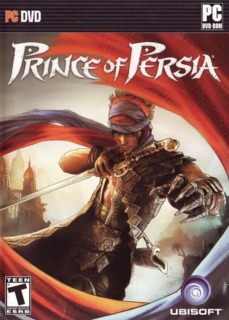Another reinvention for the Prince, with mixed results.
The new Prince of Persia attempts to reinvent a franchise which actually has already gone through this process 3 times before. First with the abysmal Prince of Persia 3D, then with the almost perfect Sands of Time and finally with that game's much darker (and lack-lustre) sequels Warrior Within and The Two Thrones.
The current-gen Prince bears more resemblance to a reluctant anti-hero like Uncharted's Nathan Drake (who shares a voice-actor with the Prince) or Star Wars' Han Solo, but the setting and consummate flowing platforming will instantly strike a chord with everyone who fondly remembers Sands of Time. However, though you may see familiarities in the setting you certainly won't with the style in which it has been rendered. The graphics in PoP are beautiful, though in an entirely different way to SoT. Ubi Soft's art team have designed beautifully rendered cell-shaded foregrounds, with stunningly animated hand-drawn backgrounds in the distance. The main characters are actually the most realistic element of the design, but really stand out with their sharp black outline. Players who register their email address with Ubi Soft can even add to their cast of characters by downloading a skin based on Altair from Assassin's Creed. Even better than that, if you pre-ordered a special edition (at least in Europe) you get access to SoT skins for the Prince and his new female companion.
Early in the game you lose your gold-laden donkey (affectionately named Farah, in a nod to SoT) and stumble across the Princess Elika in the desert. Elika provides the crux of the game's story in which her father, for reasons I won't spoil, has unleashed a dark god's power on the land. You must travel with Elika to heal "fertile grounds" in the world in order to make sure the dark god remains trapped in the magical prison designed by her ancestors. She's a feisty character and definitely a great tonic to the constantly complaining and quipping Prince
Elika also provides most of the game's intriguing mechanics. Should you fall when platforming she will use her magic to lift you from whatever pit you have managed to drop down. In a way this means that you can't die, but really its a very clever way of skipping the tedium of having to reload every time you make a mistake. The platforming itself is the usual mix of jumping, wall-running, pole-swinging and ledge-catching, but Elika also provides a new double-jump move by catching you mid-jump (when you press Y) and throwing you a few extra feet.
She also provides protection and strategy in the game's combat. Fighting, as it seems in every title in the series, is the weaker element of the game. In PoP you only fight enemies one at a time but the battles are more strategic and drawn out than SoT's. A does aerial moves, B does throws, X sword attacks and Y uses Elika's magic. Combing these together can create some great looking and very satisfying combos, but its the enemy behaviour that spoils the combat. The AI often "changes state" meaning that only certain attacks will harm them. You are supposed to tell what state they are in by subtle changes in colour and animation but these are often poorly communicated to the player. They also initate infuriating QTEs far too regularly. Other QTE's occur when you're low on health - fail them and Elika will dive in magically to save you, but the enemy instantly regains often over a third of their health back, which is incredibly annoying in the long boss fights.
Thankfully the beauty of the open-world and the exploration of its various areas and puzzles is much more entertaining. When the platforming flows it is a wonderful experience. Healing the fertile grounds after you've solved puzzles and tricky platform sequences to reach them is very satisfying. Unfortunately though, after you've healed a fertile ground the game comes over all "Banjo Kazooie."
That's right - its time to block the player's progress by forcing them to collect a bunch of little objects before they move on. The "little objects" in this case are called light seeds and you need them to access abilities that will allow you to reach new areas of the map. These range from running vertically up certain walls or straight-up flying. The sections that use these abilities are quite enjoyable. Of the 4 you gain, 2 enable different styles of what is basically a point-to-point jump, which is fine, and the vertical running is kind of fun too. Flying though is very, very loose. You're set on a pre-determined path and have to dodge obstacles with the left stick. Sometimes its quite epic with all sorts of buildings collapsing around you as you dodge them. Most of the time though these sections last too long and as soon as you brush against an obstacle you're back to the start of the flight again.
Overall Prince of Persia is a fine platform-adventure that anyone with fond memories of Sands of Time will enjoy. If you can see past the clunky combat and out-dated object collection then you'll experience a visual feast of a game that, although easy, will entertain you from beginning to end.
The good:
- Beautiful stand-out visuals
- The same flowing platform gameplay you've come to love
- An immersive (if linear) open-world
The bad:
- Long fights with clumsy combat mechanics
- Out-dated item collection necessary to progress in the story
- Not as challenging as you might expect for a PoP game.

